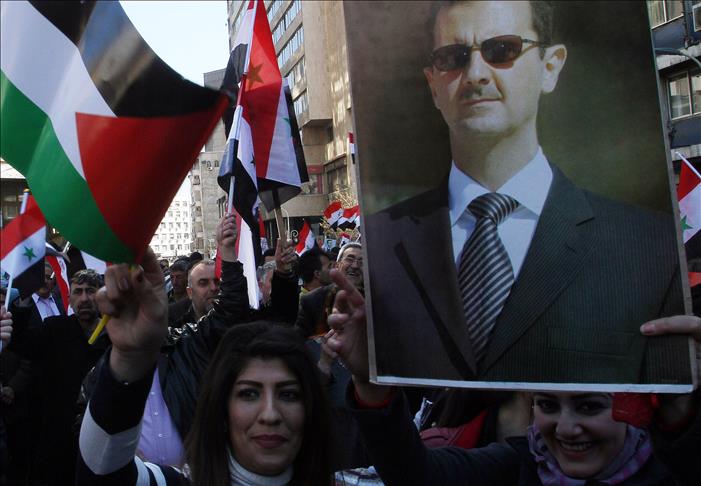
The Syrian civil war enters its fourth year this week having claimed more than 100,000 lives as well as forcing millions of people to seek shelter abroad.
The fighting, which began as popular protests against the rule of President Bashar al-Assad, has raged for three years, starting in early 2011 as part of the wider North African and Middle Eastern protest movements known as the Arab Spring.
Demonstrations spread nationwide by April that year with initial demands centering on democratic and economic reform within the framework of the existing government, before the country spiraled into civil war. This government is headed by President Assad, but who are the powerful Assad family -- rulers of Syria for over 40 years -- who are at the heart of this conflict?
- Who are the Assad family?
According to information and data compiled by the Anadolu Agency, current president Bashar al-Assad's father, Hafez al-Assad, was a statesman, politician and general who ruled Syria as president from 1971 to 2000. He was prime minister from 1970 to 1971, and secretary general of the National Command of the Arab Socialist Ba'ath [resurrection] Party from 1971 to 2000.
Hafez al-Assad, who was the first Nusayri (Alawite) president of Syria, was elected again as president in 1985. Al-Assad, who paid close attention to the country’s army and the intelligence networks, appointed trusted people and close relatives to high positions within the state in order to maintain his authority. Thus, he turned the government into a ‘Nusayri minority.’
After Hafez al-Assad's sudden death on June 10, 2000, his son and Ba'ath Party candidate, Bashar al-Assad came to power, with 97.2 percent of the vote.
- Dictatorship handed down from father to son
Born in 1965, Bashar al-Assad was regarded as a polite but faint figure by the Syrian people.
Known as a quiet child, Bashar lived his childhood during Hafez al-Assad’s conflict with Israel. After Israeli forces entered Damascus in 1973, Bashar fled to Syria’s mountainous regions, something which is believed to have had an impact on his personality.
After graduating from the medical school of Damascus University in 1988, he went to England in 1992 for to study to be an eye doctor. His life in London had a deep effect on his vision for the world.
Meanwhile, his elder brother Basil, who was regarded as the likely successor to their father, died in a traffic accident in 1994 and Bashar returned to Syria. He entered the country’s armed forces academy as senior major, before becoming lieutenant colonel in 1996 and colonel in 1999, in order to be prepared for his father’s position.
Bashar became the head of Republican Guard and, on instructions from his father, kept his distance from domestic politics. Focusing instead on foreign politics, Assad visited Lebanon, Jordan, Bahrain, Kuwait, the United Arab Emirates and Saudi Arabia.
The Syrian parliament and Ba'ath Party continued to make the necessary arrangements for Bashar to become president and in July 2000, following Hafez’s death and with the Ba'ath Party’s nomination, Bashar received 97 percent of the vote and became president. After coming to power, Bashar al-Assad lifted martial law and state-of-emergency legislation. He pardoned political prisoners, including exiles, and shut down Mezzeh Prison outside Damascus, which held 600 political prisoners.
Syria faced problems regarding financial and cultural issues during the 2000s but there was hope for reform as the Syrian population wanted a change program to be implemented.
Given Bashar al-Assad’s professional background and his relatively liberal views, some Syrians and international observers believed he would be a reformist leader, blaming senior figures around him for delays in change. However, Bashar, in the tradition of his father, had appointed relatives or people close to him to crucial positions.
The al-Assad family prioritized people from the Alawite minority when filling critical positions within the government, intelligence or security departments. Despite the fact that Bashar al-Assad has stated there is no difference between Sunni and Alawite Muslims, the al-Assad family has focused on appointing people to help them remain as Syrian rulers. This strategy was enough to keep the family in power for over 40 years.
Bashar opted to rule Syria by relying on this group, like his father. He violently repressed demonstrations in March 2011, pushing his country towards civil war.
- Bashar al-Assad: “Syria’s face towards the West”
The youthful leader of Syria married Asma Akhras, the daughter of a world-famous cardiologist Dr. Faris al-Akhras, despite his mother’s strong objections. A member of a Sunni family, Asma spent her childhood in England and graduated in computer science at King’s College London. She met Bashar while she was an employee of the Deutsche Bank.
Regarding England’s popular Princess Diana as her role model, Asma al-Assad tried to encourage her husband -- unsuccessfully -- to enact reforms. “We could not call her ‘First Lady’ when she married Bashar Assad,” an official from Syria said, adding that, “She was the wife of the president because Aniseh al-Assad was still the First Lady, despite Hafez al-Assad’s death.”
- ‘The Butcher of Dera'a’: Maher al-Assad
Maher Assad -- Bashar’s brother -- has been regarded as Syria’s second-strongest man. Dubbed the “Butcher of Dera,” Maher, as a senior army figure, has been seen as responsible for massacring hundreds of people during early anti-Assad protests in the southern city of Dera’a.
- ‘The Queen’: Aniseh al-Assad
Wife of late president Hafez al-Assad, it is believed that Aniseh al-Assad had great influence over Bashar. After her husband died, she became an important figure in Syria.
When Bushra al-Assad, Bashar’s sister, wanted to marry Assef Shawkat, who was the head of the intelligence agency, the al-Assad family strongly objected. Shawkat was rapidly promoted within the army but never got along with Maher al-Assad.
Shawkat was killed during a suicide bomb attack two years ago in Damascus, dying alongside former Minister of Defense Dawoud Rajiha and General Hassan Turkmani.
englishnews@aa.com.tr








